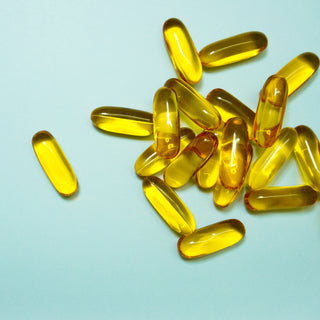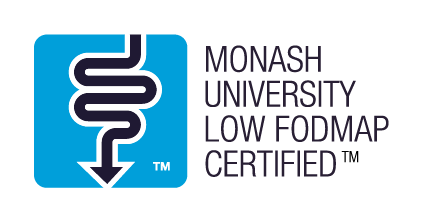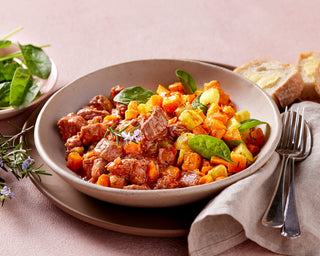
As it's men's health week, this one's decidated to the boys.
Okay, so I’m sure we’re all guilty of thinking we’re low on nutrients, then popping a multivitamin we bought from the supermarket and hoping for the best. Well, I’m here to tell you that you’re not alone, but also to advise you on what is possibly a better course of action.
What are common nutrient deficiencies in Australian men?
Australian health professionals have reported that common deficiencies in lads, like yourself, are low levels of vitamin D, magnesium, iodine, vitamin B12, calcium, and zinc.
Common symptoms associated to these deficiencies include; fatigue, severe energy changes, brittle nails, and hair loss if these nutrients are critically low. However, others may not be aware at all. So, if you take any advice from this blog, it should be to visit your local GP and get regular health checks.
Are multivitamins beneficial?
So, now we are aware of the deficiencies, we should take a men’s multivitamin and BAM problem fixed… right?
Not quite.
While multivitamins can be beneficial and helpful for some, they shouldn’t replace a healthy and balanced diet… especially your fruits and veggies. It is always super important to look at you diet and lifestyle for ways to improve your health.
Most men’s multivitamins contain very similar nutrients, which are all great, but sometimes we're not lacking in them and are already hitting our RDI’s through our diet.
(RDI = recommended daily intakes)
They commonly contain water-soluble vitamins like vitamin Bs, vitamin C, biotin, and folic acid. If your body isn't low in that vitamin or doesn’t need it for immediate use it will excrete them via urination. If you have ever taken a multivitamin, you may have noticed your urine its bright fluorescent yellow.... Yep, you pee them out!
Multivitamins also generally contain iron, calcium, magnesium, and zinc. These minerals are essential for health and aid the body in so many ways. Magnesium can be found abundantly in plants and vegetables, which is great for vegetarians and vegans!
What can I do instead of reaching for supplementation?
Let’s be honest, food makes everything better!
By eating a range of different fruits, vegetables, meats, grains, and more, you will not only increase your micronutrient intake, but also increase your fibre intake as well as antioxidants that will keep you feeling amazing from the inside out.
Great food sources of common vitamins found in multivitamins!
Vitamin C (ascorbic acid): is an antioxidant essential for growth and development within the body, it aids the absorption of iron, formation of collagen and is vital for the proper function of the immune system.
Sources: Oranges, kiwi, lemon, grapefruit, strawberries, tomatoes, cruciferous vegetables (broccoli, brussels sprouts, cabbage, cauliflower) and white potatoes.
Biotin: is essential for hair and nail growth, promotes brain function and aids in the management of blood sugar levels.
Sources: organ meats, eggs (cooked), fish, meat, seeds, nuts, sweet potatoes, avocados, bananas, and raspberries.
Vitamin B1 (thiamine): plays a role in supporting the nervous system and metabolism function by helping to release the energy from food.
Sources: Fortified breakfast cereals, pork, fish, beans, lentils, green peas, sunflower seeds, and yogurt.
Vitamin B2 (riboflavin): a water-soluble vitamin involved in many bodily processes including healthy development of the skin, digestive tract lining, blood cells, and brain function.
Sources: Dairy milk, yogurt, cheese, eggs, lean beef and pork, organ meats, chicken breast, and salmon.
Vitamin B12: is essential in maintaining healthy blood and nerve cells. It aids in the development of DNA within the body, as well as supporting energy and memory.
Sources: Fish, meat, poultry, eggs, and dairy products.
Folate (folic acid): plays a role in the functioning of the digestive system, brain, nerve, and blood cell function. It also supports fertility and the prevention of birth defects.
Sources: Citrus fruits, spinach, asparagus, brussels sprouts, broccoli, beans, sunflower seeds, fruits, wholegrains, seafood.
Calcium: is vital for the building and maintenance of healthy bones and teeth. It also helps to support your heart, muscles, and nerves.
Sources: Cheese, milk, yoghurt, fortified plant-based milks (almond, soy, rice), edamame, tofu, canned sardines, and salmon.
Iron: helps in the development of healthy red blood cells and the regulation of body temperature, whilst also being essential for energy and focus.
Sources: Red meat, shellfish, nuts, wholemeal pasta and bread, legumes, beans, lentils, chickpeas, spinach, silver beet, broccoli, oats, and tofu.
Zinc: is a mineral that aid in wound healing, blood clotting, and thyroid function.
Sources: Wholegrains, milk products, oysters, red meat, poultry, chickpeas, cashews, and almonds.
Now, if you're still keen on taking a multivitamin, I should probably inform you that the best time to take them is with a nice, healthy breakfast! (Yes, you heard right, not on an empty stomach downed with your coffee).Taking your vitamins with a meal helps your body absorb the nutrients better!
Overall, multivitamins can be great for supplementing, however, the best way to improve your health is to focus on your diet. Choose to enjoy your vitamins, don't just swallow them!
Kiana Lucia
References:
https://www.menshealth.com/nutrition/a19544026/5-nutrients-youre-not-getting-enough/
https://fullscript.com/blog/common-nutrient-deficiencies-in-men
https://bmcnutr.biomedcentral.com/articles/10.1186/s40795-020-00336-9









